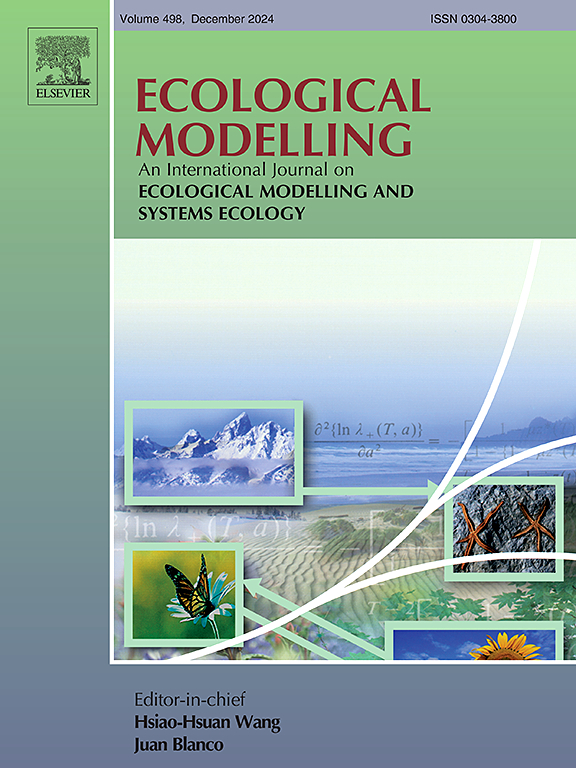Loop reinforcement as a mechanism of self-organization
IF 3.2
3区 环境科学与生态学
Q2 ECOLOGY
引用次数: 0
Abstract
The process of self-organization is critical to understanding the Maximum Power Principle. Self-organization is the process whereby the parts or components of a system become organized so that power (e.g., metabolism when the system is an ecosystem) of the whole system is maximized. H. T. Odum wrote extensively on how self-organization takes place but his conception lacked experimental verification and mechanistic rigor. In other words, he never scientifically demonstrated how self-organization works. In Odum’s thinking, self-organization was a selection process, with similarities but also differences with Darwinian natural selection. He sometime referred to it as a “trial and error”-type process. This presentation reviews Odum’s thinking on the loop reinforcement mechanism of self-organization, which was the main mechanism he discussed. Loop reinforcement in ecosystems means that the species that feeds back energy to bring in the greatest energy (to itself and to the ecosystem) will be selected for in ecological interactions during succession. Thus, the species that brings in the most energy from sources downstream of itself within the networks of the system will be selected for, and as a result the metabolism of the ecosystem will be maximized relative to alternative configurations of the networks. A model demonstration of loop reinforcement in emergy units is given for a plant-herbivore interaction from the literature to provide additional perspective on the existence of the mechanism. The presentation concludes with speculations on how Odum might have derived his understanding of self-organization without conventional scientific demonstration.
作为自组织机制的循环强化
自组织过程是理解最大功率原理的关键。自组织是指一个系统的各部分或组成部分组织起来,使整个系统的能量(例如,当系统是一个生态系统时,新陈代谢)最大化的过程。h.t. Odum写了大量关于自组织如何发生的文章,但他的概念缺乏实验验证和机械的严谨性。换句话说,他从来没有科学地证明过自组织是如何工作的。在Odum的思想中,自组织是一个选择过程,与达尔文的自然选择既有相似之处,也有不同之处。他有时将其称为“试错”式的过程。本次演讲回顾了Odum关于自组织的环路强化机制的思考,这是他讨论的主要机制。生态系统中的循环强化意味着在演替过程中的生态相互作用中,回馈能量以带来最大能量(对自身和对生态系统)的物种将被选择。因此,在系统的网络中,从自身下游带来最多能量的物种将被选择,因此,相对于网络的其他配置,生态系统的新陈代谢将最大化。从文献中给出了植物-食草动物相互作用中能量单位环路强化的模型演示,以提供有关该机制存在的额外视角。在演讲的最后,我们推测了Odum是如何在没有常规科学论证的情况下推导出他对自组织的理解的。
本文章由计算机程序翻译,如有差异,请以英文原文为准。
求助全文
约1分钟内获得全文
求助全文
来源期刊

Ecological Modelling
环境科学-生态学
CiteScore
5.60
自引率
6.50%
发文量
259
审稿时长
69 days
期刊介绍:
The journal is concerned with the use of mathematical models and systems analysis for the description of ecological processes and for the sustainable management of resources. Human activity and well-being are dependent on and integrated with the functioning of ecosystems and the services they provide. We aim to understand these basic ecosystem functions using mathematical and conceptual modelling, systems analysis, thermodynamics, computer simulations, and ecological theory. This leads to a preference for process-based models embedded in theory with explicit causative agents as opposed to strictly statistical or correlative descriptions. These modelling methods can be applied to a wide spectrum of issues ranging from basic ecology to human ecology to socio-ecological systems. The journal welcomes research articles, short communications, review articles, letters to the editor, book reviews, and other communications. The journal also supports the activities of the [International Society of Ecological Modelling (ISEM)](http://www.isemna.org/).
 求助内容:
求助内容: 应助结果提醒方式:
应助结果提醒方式:


